Legendary Travellers:2: Journey to Lhasa
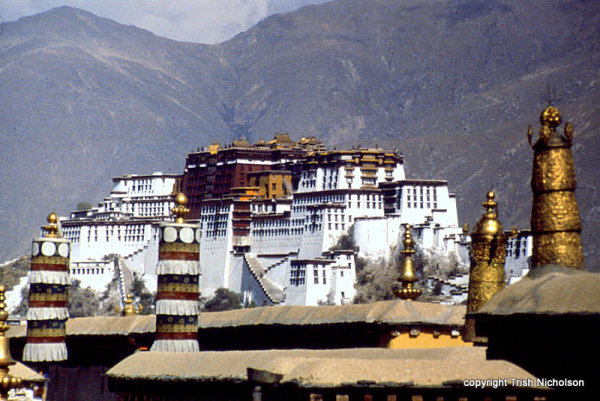
Dressed as a beggar, a revolver concealed in her bodice, fifty-four-year-old Madame Alexandra David-Neel walked into Lhasa, the holy city of a country forbidden to foreigners. By her side strolled Yongden, a young Sikkimese monk she had adopted as her son.
Some days later, a guard hit her with a stick for wandering into an area reserved for high-status officials. She was delighted. “What a wonderful incognito is mine!” she boasted to Yongden, “Now I am even beaten in the street!” It was 1924; for two months she succeeded in evading not only the Tibetan authorities but also the British. They had appropriated Tibet since 1904 when Sir Francis Younghusband had ridden his company across the plain of Guru, guns blazing, because Lord Curzon thought the Russians had got there first. His intelligence was wrong, but British forces jealously guarded their political and commercial interests in Tibet, forbidding entry to outsiders.
Alexandra’s journey had not been a sudden impulse. As a child she had longed for solitude, and the freedom to travel; wandering, fascinated, along the polished railway lines near her home, she imagined they led to far off destinations in deserts, mountains and forests. Later, in Paris, she studied Eastern philosophy as well as journalism. This led to a commission to interview the Dalai Lama who was then taking refuge from *Chinese political interference in a Himalayan village in British-held Sikkim, close to the Tibetan border.
The path…starts from a low point in Sikkim, amid tropical vegetation, wild orchids, and the living fireworks of fireflies. Gradually, as one climbs, the scenery changes, nature becomes severe, the singing of birds and the noisy buzzing of insects subside. The huge trees, in their turn, are unable to struggle in the rarefied air of the summits. With each mile the forest becomes more stunted, till the shrubs are reduced to the size of dwarfs creeping on the ground,
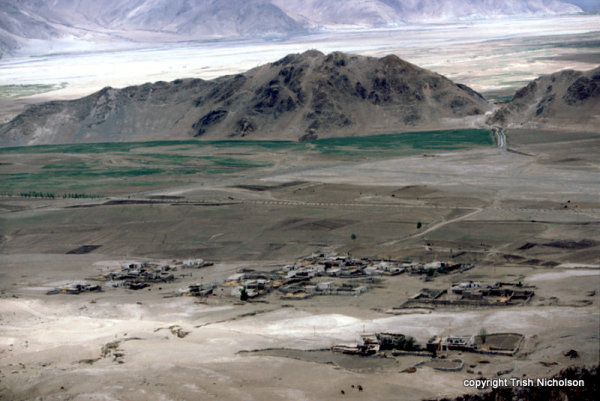
A tantalising glimpse of Tibet from across the mountain peaks set her determination to know that mystical and hidden land. But there was no rush. She had already achieved much.
Her first career had been in opera, singing in Asia, the Middle East and North Africa with a French touring company during 1895/6. Then this independent, freedom-loving woman took the extraordinary step of marrying. Domesticity that lasted only days; though fond of Philippe, who was a distant cousin, Alexandra felt trapped.
After several years of further study, writing, and tutoring in a Belgian University, Alexandra sailed for India in 1911. Having accomplished the audience with the Dalai Lama, she continued her pursuit of Buddhism in India where she qualified as a lama, and improved her skills in spoken Tibetan by sneaking across the Tibetan border to spend the winter in a remote monastery. The following year, after several months in a cave in Sikkim, she reached as far as Shigatse in Tibet before the British authorities heard of her illegal activities and ordered her deportation from India.
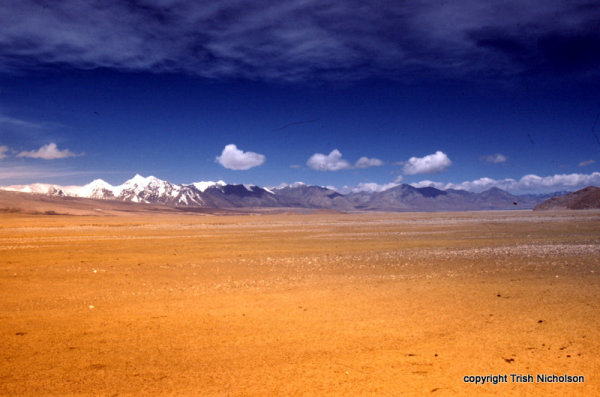
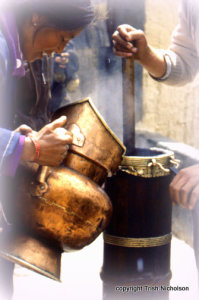
More determined than ever, she decided the best route in future would be through China. By this time she had met Yongden. Together they spent the next few years meandering between monasteries in Burma, Korea, Japan, and China, keeping healthy with the habit of drinking hot morning tea.
China was torn by civil war; crossing it from Peking (Beijing) in 1917, they travelled by forest paths when they could, sleeping under trees and in caves. Some days they were rewarded by sudden clearings, revealing: landscapes of shining snow-clad mountains, towering high in the blue sky, frozen torrents and glittering waterfalls hanging like gigantic and immaculate curtains from the rugged rocks.
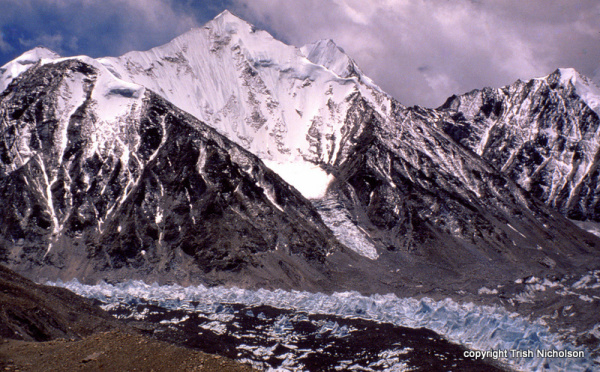
When they came upon isolated monasteries and hamlets, they begged hospitality, learning to defend themselves against guard dogs let lose in places they were unwelcome. In 1920, at the western borders between China and Tibet, they reached the renowned Tibetan monastery of Kumbum and stayed for three years, studying Tantric Buddhism, perfecting fluency in Tibetan, and making forays into surrounding areas on mules and yaks. They crossed dusty plains dotted with the remnants of ancient forts perched atop incredible precipices, and joined other travellers where possible to avoid marauding bandits.
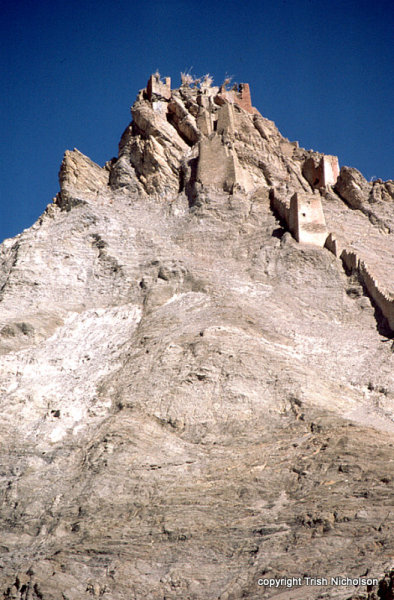
One evening when they were alone, Alexandra was walking ahead looking for a good camping spot when seven men blocked her way and asked where she was going. Calmly, she named some holy shrines and they moved on to talk to the lama, Yongden. They stole from him two rupees he had tied in a handkerchief. When she realised what was happening, Alexandra feared they would open the baggage Yongden was carrying and find not only the gold coins sewn into their clothes, but foreign items that would betray her disguise. If her identity were discovered, her mission would fail after twelve years of arduous preparation. She acted with characteristic élan.
She ranted at the men as if possessed, calling down the most terrible and feared Tantric deities, cursing and threatening the bandits in fluent Tibetan.
The seven robbers looked petrified, some standing in one line against a rock behind my son, and others lower down on the path – an awe-struck group which tempted my photographic inclinations. But the hour was not ripe for snapshots.
From a safe distance, the robbers offered to return the two rupees and, once she had coolly accepted them, asked Yongden for his blessing before retreating back to their villages.
Anticipation of her goal must have been acute, but they travelled on, and not until they reached the monastery of Jakyendo did Alexandra feel ready for their final journey into Lhasa as Tibetan pilgrim-beggars, mother and son. She darkened her skin, dyed her hair with Chinese ink, tucked scribbled route maps into her boots, and struggled for four months through the blizzards of a Tibetan winter to walk demurely – but inwardly exultant – into Lhasa. Lha gyalo! (The Gods win!).
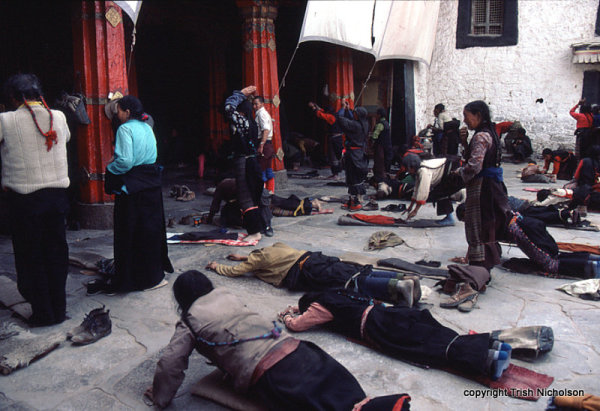
Even living rough and in monastic austerity, money is necessary for travelling – in this case, if only for the sea passage between Europe and Asia – and one always wonders where it came from. We know where Alexandra’s funds came from: one more extraordinary fact. Despite their briefest of marriages, she and Philippe remained friends; they corresponded during her years overseas, he sending money to her at regular intervals even through war-torn China. When she returned to France in 1925 and began writing up her travels, he became her literary agent.
Alexandra and Yongden made further journeys to Tibet and elsewhere in the East until 1945; she was then in her 79th year and settled down to further writing on Eastern philosophy and mysticism, including three novels set in Tibet. The hot morning teas must have been extremely effective: she was almost 101 years old when she died in 1969 having achieved everything she had set her heart on doing.
Source and quotations: My Journey to Lhasa, Alexandra David-Neel, Virago (1983 edition; originally published by Wm. Heinemann 1927).
Photographs: from my own travels in Tibet in 1983.
If you would like to know more about Alexandra, you can access the official Alexandra David-Neel website.
And if you missed the first in this series of Legendary Travellers, you can read it here.
*China’s occupation of Tibet since 1950 has resulted in thousands of Tibetan deaths, and repression continues to strengthen. If you would like to know about the Tibetan people’s struggle for freedom, see the website of The Free Tibet Organisation

Fascinating! I will definitely look up more about these places and Alexandra
A wonderful post, Trish. I’ll be back to read the first one and any others!
Hi Joe, and Val, thank you for visiting, so glad you enjoyed the post, it is encouraging to have feedback. There will definitely be other posts in the series, but with one book in final preparation for publication, and another in the midst of being written, I struggle to accomplish everything. I admire those who seem able to fit so much more into their week, including weekly blog posts. I’ll be back with the next post as soon as I can…